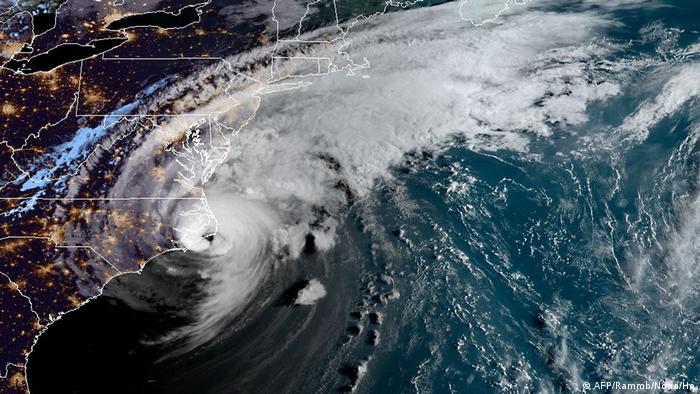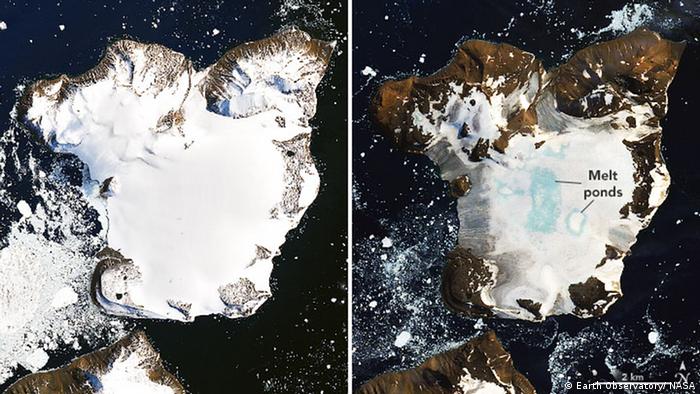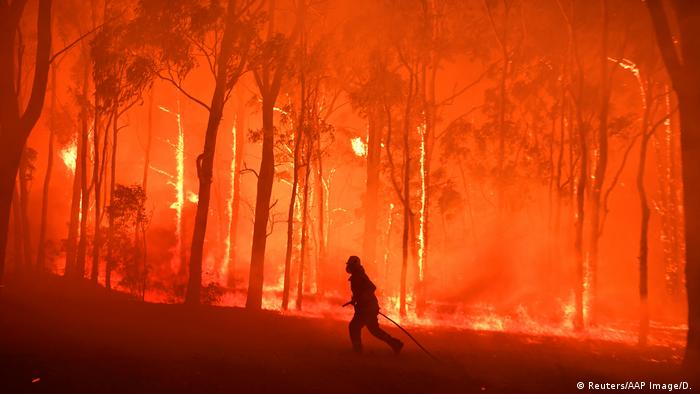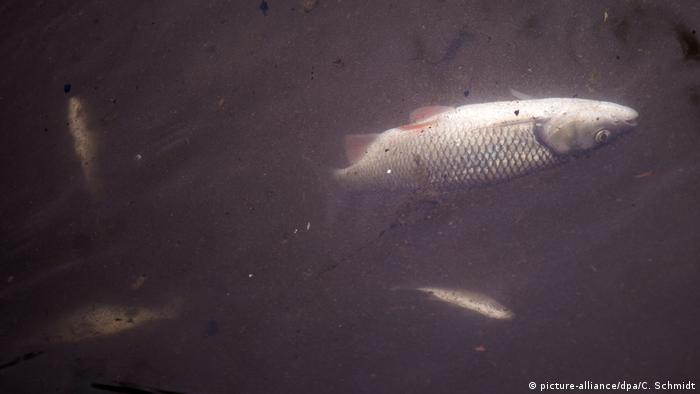WetterOnline has won its case against Germany’s national weather service. The company sued the service over the anti-competitive nature of its free weather forecast app.
The German Weather Service (DWD) will no longer be allowed to provide general weather forecasts in a free mobile phone app after a federal court ruled in favor of a private firm on Thursday.
The Federal Court of Justice (BGH) in Karlsruhe said the national meteorological service will only be permitted to offer extreme weather warnings for free and that a DWD app offering general weather forecasts must contain advertisements or be purchased by users.
The case came about when a lawsuit was filed by private provider WetterOnline against the DWD.
Unfair advantage
The private Bonn-based firm considered the DWD app anti-competitive as it put commercial providers at a disadvantage since they could not provide the information for free .
Until now, the DWD offered an application that could be used to retrieve not only severe war nings but also general forecasts.
The judges in Karlsruhe ruled in favor of the private firm as the German Weather Service, based in Offenbach, Hesse, had exceeded the legal mandate for its activities with this offer and wanted to limit the DWD’s activities to protect private competitors.
-
)
 Catastrophes triggered by warming oceans
Catastrophes triggered by warming oceans 
A California day at the South Pole
In Antarctica, scientists measured temperatures on par with Los Angeles. In February, a record 3 degrees Celsius (.9 degrees Fahrenheit) was measured at the Argentinean research station Esperanza Base in the north Antarctic. This was the highest temperature since measurements began there, according to NASA. The warm weather led to quickly developing melt ponds (pictured right).
Catastrophes triggered by warming oceans

 More frequent and stronger storms
More frequent and stronger storms As oceans warm, the intensity of tropical cyclones will increase. The hurricane or typhoon season will last longer and there will be significantly more hurricanes, especially in the North Atlantic and the northeast Pacific. Extreme weather conditions will result in extremely destructive storms in the future, even in regions that have so far been spared.
- Catastrophes triggered by warming oceans
Rising sea levels and storm surges )
Oceans warm along with the rising temperatures of the Earth’s atmosphere, albeit with a delay. This leads to a thermal expansion of the water masses, causing sea levels to rise further. The habitats and livelihoods of numerous coastal inhabitants – especially in poorer regions – will be lost.
- Catastrophes triggered by warming oceans Oxygen decreases Warmer water stores less oxygen, so warming oceans lead to expanding areas that are oxygen-poor. In many rivers, lakes and lagoons, oxygen-poor “death zones” already exist where animals can’t live because too little oxygen is dissolved in the water.

 Forest fires as a result of extreme weather
Forest fires as a result of extreme weather
While there will be heavy precipitation and flooding in some places, extreme weather conditions elsewhere will cause very dry periods. Crop failures and devastating forest fires will be the result. The fire season will last much longer in in many places, and the number of fires will increase dramatically.

Catastrophes triggered by warming oceans 
Relocating entire ecosystems
Warmer oceans will drive species, and eventually entire marine ecosystems, into colder regions. Fish and marine mammals will migrate toward the poles, just like land animals. The cod populations in the North Sea, for example, are already shrinking faster than can be explained by overfishing alone. Fishing regions further north could benefit from this development.
Warmer oceans will drive species, and eventually entire marine ecosystems, into colder regions. Fish and marine mammals will migrate toward the poles, just like land animals. The cod populations in the North Sea, for example, are already shrinking faster than can be explained by overfishing alone. Fishing regions further north could benefit from this development.

 Acidified seas
Acidified seas
Heating causes CO2 to dissolve directly in surface water, the pH value of seawater then decreases and the water “acidifies.” Mussels, starfish, corals, crabs and sea urchins lose their ability to form exoskeletons or endoskeletons in these conditions. This means that they will disappear, leading to unfiltered water and a lack of food for other marine life.

 Catastrophes triggered by warming oceans Less plankton as fodder )
Catastrophes triggered by warming oceans Less plankton as fodder )
As the pH value decreases due to increased CO2 absorption, small algae aren’t able to absorb as much iron. But plankton needs this mineral for strong growth. Since many phytoplankton species also form calcareous skeletons, they are likely to be affected by acidified water.

 Explosive algae blooms
Explosive algae blooms
In warm, oxygen-poor water, toxic algae bloom and can multiply explosively. Their poison kills fish and other sea creatures. Algae carpets are already threatening the fishing industry and tourism in many places. Here is a picture from Chile’s coast, where red algae killed thousands of fish with their nerve poison.

 Catastrophes triggered by warming oceans
Catastrophes triggered by warming oceans  Empty white coral skeletons
Empty white coral skeletons
Warming oceans cause coral to lose not only its color but also its ability to reproduce, as a result of heavy coral bleaching. Coral reefs die off and provide no protection, no food and no hunting grounds for a variety of marine life.
 Catastrophes triggered by warming oceans
Catastrophes triggered by warming oceans 
Changing ocean currents
If the North Atlantic Current were to be interrupted by ocean warming, it would result in a severe cold spell throughout western and northern Europe. This is because the current ensures the continuous circulation of seawater as dense surface water sinks into deeper, cooler layers. The other oceanic currents would also be affected by such an interruption.
Author: Alexander Freund (fs)
(
jsi / sms (AFP, dpa)
Read More 




![Potential false-positive rate among the 'asymptomatic infected individuals' [..], Hacker News](https://digitalive.world/wp-content/uploads/2020/03/73256/potential-false-positive-rate-among-the-asymptomatic-infected-individuals-hacker-news-150x150.png)

GIPHY App Key not set. Please check settings